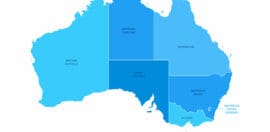From multicultural to inclusive: there’s more work to do

4 July 2022 at 3:24 pm
It’s important following the first tranche of the 2021 Census data, that we don’t fall into the trap of confusing multiculturalism with inclusion, writes Violet Roumeliotis.
Celebrating Australia’s multiculturalism and diversity is not the same as actual inclusion and belonging. That is why policy makers and governments, and indeed all of us as individuals and communities, need to work harder.
The Australian Bureau of Statistics 2021 Census figures released last week show that more than half of Australian residents now come from overseas or have a parent born overseas.
Census data revealed that 48.2 per cent of the population have a parent born in another country and 27.6 per cent report a birthplace overseas. Just under one quarter of all households, 24.8 per cent, speak a language other than English in the home.
As well as being a multicultural nation, we are also a nation that says we support multiculturalism.
In annual research tracking community sentiment, the most recent 2021 Mapping Social Cohesion Report by the Scanlon Foundation found that 84 per cent of people agree that “immigrants improve society by bringing new ideas and cultures”, while 86 per cent agree that “immigrants are generally good for the economy”.
However, a truly inclusive, multicultural Australia would see people accessing universal services such as health, education, employment, housing and justice, at the same or similar rates irrespective of their country of birth or linguistic background.
Yet, taking health as an example, we know from the pandemic that mortality rates among migrants were higher than for the wider Australian community.
While people from culturally diverse backgrounds are not homogenous, service providers and government agencies typically adopt a “one-size-fits-all” approach, as happened during the pandemic in relation to communication with migrant and refugee communities, which likely contributed to the higher burden of COVID-19 in those communities.
What’s needed is a service system that is culturally responsive to diverse needs and preferences. This entails having the skills and capacity to reach and respond to all residents in all their diversity.
It’s about acknowledging the issues, identifying the barriers and developing targeted services that are responsive to culturally diverse needs. And it can be done –through training in culturally responsive practice, recruiting a more diverse workforce, offering more information in community languages, deeper engagement with specialist multicultural organisations and tapping into a wider set of communication channels to reach diverse communities.
An inclusive, multicultural Australia would also see a more coordinated response to racism, which is often overlooked in Australia.
For example, a recent Racism at Work report by Diversity Council Australia found that 88 per cent of survey respondents agreed racism was an issue in Australian organisations and 93 per cent agreed organisations needed to take action. However, only 27 per cent said their organisations were proactively preventing workplace racism.
Thankfully there is some light on the horizon with the Australian Human Rights Commission (AHRC) and many others leading the charge for change with the development of a National Anti-Racism Framework. This would be similar to longstanding frameworks that are in place for domestic violence and child abuse, and facilitate a whole-of-government and whole-of community response to racism.
The new Labor government has committed funding to the Australian Human Rights Commission to complete the development of the National Anti-Racism Framework and implement a comprehensive national anti-racism strategy.
In a submission to a consultation process on the proposed framework earlier this year Settlement Services International (SSI) recommended that the framework focus on addressing systemic racism and widen the discussion of the harms arising from racism to include the social, political, health and economic consequences.
The framework should also include guidance for individuals on understanding and responding to racism as well as offer practical guidance to organisations and institutions on how they can identify and address systemic racism. A starting point to gain more information is the resources at Racism. It Stops with Me.
Finally, and importantly, an inclusive multicultural Australia would see multicultural communities playing their part in ongoing and respectful dialogue with Aboriginal and Torres Strait Islander communities to support the vision embodied in the Uluru Statement from the Heart.
Our population is changing, and we need to change with it. Let’s all get on board with the vision and help create a more harmonious society where we can all feel that we belong.







